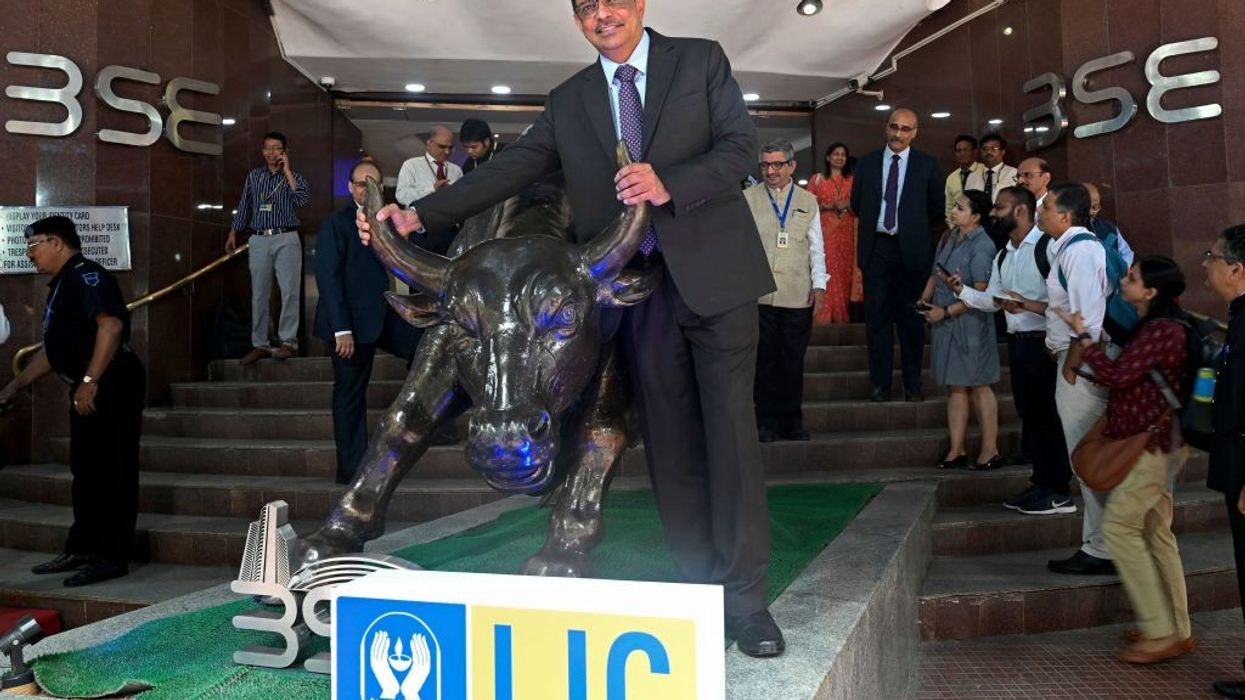INDIAN state-owned insurance giant LIC slumped on its market debut on Tuesday (17) following the country's biggest-ever initial public offering, closing nearly eight per cent below the IPO price.
Prime minister Narendra Modi's government raised $2.7 billion (£2.16 bn) by selling 3.5 per cent of Life Insurance Corporation of India as his administration seeks to sell off state assets to bolster tattered public finances.
But it was forced to cut back the offer from a planned five per cent after markets turned volatile following Russia's invasion of Ukraine and China's Covid lockdowns.
The offer price of Rs 949 (£9.81) had valued LIC at $77 bn (£61.70 bn), but the stock traded under pressure all day, closing 7.75 per cent lower at Rs 875.45 (£9.05) a share.
The muted debut could test market appetite as Modi seeks to privatise more shares in nationalised companies to plug an estimated Rs 16.6 trillion (£171.49 bn) fiscal deficit.
Market analyst Arun Kejriwal said the slump on LIC's first day of trading was a "learning" experience, adding that the government will have to do more to convince investors if it wants to sell more of its stake.
But the IPO saw enthusiastic participation from small investors - including many first-timers - and was oversubscribed nearly three times.
"I knew it won't be a great listing but it doesn't matter to me," said 30-year-old Ayush, a recent market entrant, who was unbowed by the decrease in share price.
"I bought the shares for the long-term."
Global equities have been tumultuous for most of 2022. Foreign investors have withdrawn a net Rs 1.71 trillion (£17.63 bn) from Indian markets so far this year, stock exchange data showed, as US monetary policy tightening further roiled sentiment.
Synonymous with life insurance
India was heavily regulated for decades after independence, and the state still retains an outsize role in the economy.
Hundreds of companies are owned by national or lower-level governments, operating in fields ranging from mining and resources to electricity and construction.
Modi has pledged to "monetise and modernise" the sometimes moribund sector, and the insurance giant's IPO followed a years-long effort by bankers and bureaucrats to appraise the mammoth firm and prepare it for listing.
Founded in 1956 by nationalising and combining more than 240 firms, LIC was a monopoly until private companies were allowed to enter the market in 2000.
It continues to lead the pack with a 61 per cent market share and an army of 1.3 million "LIC agents" giving it huge reach, particularly in remote rural areas.
But its dominance has declined steadily in the face of competition from net-savvy private insurers offering specialised products.
The firm warned in its regulatory filing that "there can be no assurance that our corporation will not lose further market share" to private companies.
'Enormous' potential’
In a country where only three per cent of the 1.4 billion population has life insurance, analyst Kejriwal said LIC's potential remains "enormous".
"It has actually bounced back in the last two-three years. And Covid has seen a turnaround in the fortunes of LIC," he said, pointing to its digitisation efforts.
Going public will also force more transparency on the insurance behemoth.
"The IPO is going to galvanise LIC into being much more effective than it was," Kejriwal added.
LIC is also India's largest asset manager, with Rs 39.55 trillion (£410 bn) under management as of September 30, including significant stakes in Indian blue chips such as Reliance and Infosys.
LIC's real estate assets include vast offices at prime urban Indian locations, including a 15-storey office in Chennai that was once the country's tallest building.
The firm is also believed to own a large collection of rare and valuable artwork that includes paintings by MF Husain - known as the Pablo Picasso of India - although the value of these holdings has not been made public.
(AFP)
Indian insurance giant slumps after country's biggest IPO




